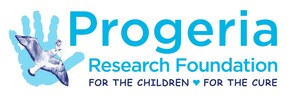PEABODY, Mass., Jan. 6, 2021 /PRNewswire/ -- The Progeria Research Foundation (PRF) announced today the publication of a breakthrough preclinical mouse study in the journal Nature, demonstrating the substantial effect of genetic editing in directly reversing the mutation that causes Hutchinson-Gilford Progeria Syndrome (HGPS, or Progeria). Scientists at Broad Institute, the National Institutes of Health (NIH), PRF and others contributed to this ground-breaking study, indicating a critical new pathway toward correcting the root cause of Progeria.
Progeria is an ultra-rare, fatal, pediatric rapid-aging disease, affecting approximately 400 children worldwide. Without the FDA-approved treatment Zokinvy (lonafarnib), children with Progeria die of heart disease at an average age of 14.5 years, due to premature atherosclerosis resulting in heart attacks. Zokinvy increases average lifespan by 2.5 years and improves some symptoms of Progeria, but it does not address the genetic mutation that causes the disease.
Using a newer form of genetic editing, known as base editing, researchers found that they could reverse the mutation that causes Progeria, improving disease symptoms and dramatically increasing lifespan in a Progeria mouse model. With a single injection of a base editor programmed to correct the disease-causing mutation, mice survived 2.5 times longer than control untreated Progeria mice, to an age corresponding with the start of old age in healthy mice. Importantly, all treated mice also retained healthy vascular tissue—a significant finding, as loss of vascular integrity is a predictor of mortality in children with Progeria.
Progeria is caused by the mutation of a single DNA letter or base that causes the buildup of a toxic protein known as progerin. When applying the base editing technique in the laboratory to cells taken from children with Progeria, the teams observed that 90% of the cells were successfully edited, resulting in reduced levels of progerin.
"We founded The Progeria Research Foundation because there was nowhere for children and their families to go for help, no research, no known cause, and no treatment for our son Sam or other children with Progeria," said Leslie Gordon, MD, PhD, PRF Medical Director and study co-author. "Today, we know the cause and have a life-extending treatment, and Progeria is now on the forefront of a genetic therapy that could make a huge difference for these children. Everyone on this top-level research team is driven by their passion for helping the children with Progeria. We look forward to working towards a possible clinical treatment trial."
The study published today in Nature was co-led by David Liu, PhD, Richard Merkin Professor and Director of the Merkin Institute of Transformative Technologies in Healthcare at the Broad Institute, Cambridge, MA; Francis Collins, MD, PhD, Director of the NIH and Senior Investigator at the National Human Genome Research Institute; and Jonathan Brown, Assistant Professor of Medicine in the Division of Cardiovascular Medicine at Vanderbilt University. The study was co-funded by PRF and co-authored by Leslie Gordon, MD, PhD, PRF Founder and Medical Director.
"To our knowledge, this work resulted in the strongest rescue of the symptoms of Progeria by multiple measures," said co-corresponding author, David Liu, PhD. "Five years ago, we were still finishing the development of the very first base editor. If you had told me then that within five years, a single dose of a base editor could address Progeria in an animal at the DNA, RNA, protein, vascular pathology, and lifespan levels, I would have said 'there's no way.' It's a real testament to the dedication of the team that made this work possible."
"When my research lab identified the genetic cause of Progeria in 2003, we hoped that someday this might lead to a way to help these children," said Dr. Collins. "Along the way, we've made some progress with drug therapy, but the potential of actually correcting the fundamental cause at the DNA level is beyond anything we could have imagined back then. To see this dramatic response in our Progeria mouse model is one of the most exciting therapeutic developments I have been part of in 40 years as a physician-scientist."
Further safety and efficacy studies are currently underway to examine these results and investigate potential ways to mitigate the risks. The results are being explored in additional preclinical studies, with the eventual goal of launching a clinical trial.
About The Progeria Research Foundation
The Progeria Research Foundation (PRF) is a nonprofit organization established in 1999 by the family of Sam Berns, a child with Progeria. PRF funds and conducts research-related programs, including the clinical trials and studies that led to approval of the first-ever FDA-approved drug for Progeria, Zokinvy. PRF is the only organization in the world solely dedicated to finding treatments and the cure for Progeria and its aging-related conditions, including heart disease. Due to the discovery of the biological connection between Progeria, heart disease and aging, finding the cure for one of the rarest diseases on earth could provide keys for treating millions of adults with heart disease and stroke associated with the natural aging process, as well as help the entire aging population.
The organization fills a void, taking these children out of the background where they had been for more than 100 years and putting them and Progeria at the forefront of scientific efforts. PRF's International Progeria Patient Registry includes children from 65 countries.
For more information and to support PRF's mission, please visit www.progeriaresearch.org.
SOURCE Progeria Research Foundation

Related Links
WANT YOUR COMPANY'S NEWS FEATURED ON PRNEWSWIRE.COM?
Newsrooms &
Influencers
Digital Media
Outlets
Journalists
Opted In






Share this article